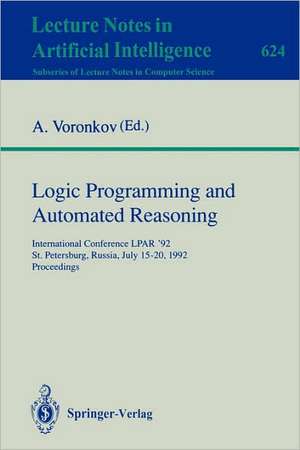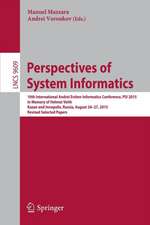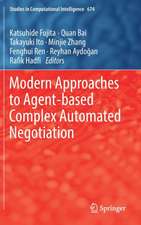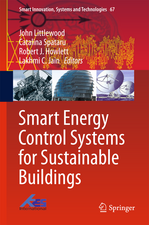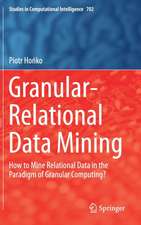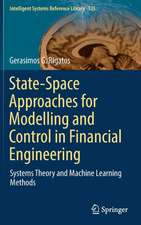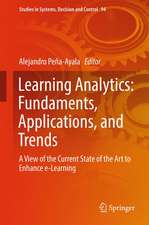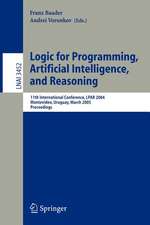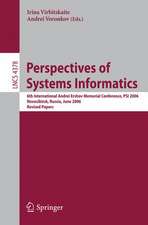Logic Programming and Automated Reasoning: International Conference LPAR '92, St.Petersburg, Russia, July 15-20, 1992. Proceedings: Lecture Notes in Computer Science, cartea 624
Editat de Andrei Voronkoven Limba Engleză Paperback – iul 1992
| Toate formatele și edițiile | Preț | Express |
|---|---|---|
| Paperback (2) | 338.16 lei 6-8 săpt. | |
| Springer Berlin, Heidelberg – 29 iun 1993 | 338.16 lei 6-8 săpt. | |
| Springer Berlin, Heidelberg – iul 1992 | 343.95 lei 6-8 săpt. |
Din seria Lecture Notes in Computer Science
- 20%
 Preț: 1061.55 lei
Preț: 1061.55 lei - 20%
 Preț: 307.71 lei
Preț: 307.71 lei - 20%
 Preț: 438.69 lei
Preț: 438.69 lei - 20%
 Preț: 645.28 lei
Preț: 645.28 lei -
 Preț: 410.88 lei
Preț: 410.88 lei - 15%
 Preț: 580.46 lei
Preț: 580.46 lei - 17%
 Preț: 427.22 lei
Preț: 427.22 lei - 20%
 Preț: 596.46 lei
Preț: 596.46 lei -
 Preț: 449.57 lei
Preț: 449.57 lei - 20%
 Preț: 353.50 lei
Preț: 353.50 lei - 20%
 Preț: 1414.79 lei
Preț: 1414.79 lei - 20%
 Preț: 309.90 lei
Preț: 309.90 lei - 20%
 Preț: 583.40 lei
Preț: 583.40 lei - 20%
 Preț: 1075.26 lei
Preț: 1075.26 lei - 20%
 Preț: 310.26 lei
Preț: 310.26 lei - 20%
 Preț: 655.02 lei
Preț: 655.02 lei - 20%
 Preț: 580.93 lei
Preț: 580.93 lei - 20%
 Preț: 340.32 lei
Preț: 340.32 lei - 18%
 Preț: 938.83 lei
Preț: 938.83 lei - 20%
 Preț: 591.51 lei
Preț: 591.51 lei - 15%
 Preț: 438.59 lei
Preț: 438.59 lei - 20%
 Preț: 337.00 lei
Preț: 337.00 lei -
 Preț: 389.48 lei
Preț: 389.48 lei - 20%
 Preț: 607.39 lei
Preț: 607.39 lei - 20%
 Preț: 1024.44 lei
Preț: 1024.44 lei - 20%
 Preț: 579.30 lei
Preț: 579.30 lei - 20%
 Preț: 763.23 lei
Preț: 763.23 lei - 20%
 Preț: 453.32 lei
Preț: 453.32 lei - 20%
 Preț: 575.48 lei
Preț: 575.48 lei - 20%
 Preț: 585.88 lei
Preț: 585.88 lei - 20%
 Preț: 825.93 lei
Preț: 825.93 lei - 20%
 Preț: 763.23 lei
Preț: 763.23 lei - 17%
 Preț: 360.19 lei
Preț: 360.19 lei - 20%
 Preț: 1183.14 lei
Preț: 1183.14 lei - 20%
 Preț: 340.32 lei
Preț: 340.32 lei - 20%
 Preț: 504.57 lei
Preț: 504.57 lei - 20%
 Preț: 369.12 lei
Preț: 369.12 lei - 20%
 Preț: 583.40 lei
Preț: 583.40 lei - 20%
 Preț: 343.62 lei
Preț: 343.62 lei - 20%
 Preț: 350.21 lei
Preț: 350.21 lei - 20%
 Preț: 764.89 lei
Preț: 764.89 lei - 20%
 Preț: 583.40 lei
Preț: 583.40 lei - 20%
 Preț: 649.49 lei
Preț: 649.49 lei - 20%
 Preț: 341.95 lei
Preț: 341.95 lei - 20%
 Preț: 238.01 lei
Preț: 238.01 lei - 20%
 Preț: 538.29 lei
Preț: 538.29 lei
Preț: 343.95 lei
Preț vechi: 429.93 lei
-20% Nou
Puncte Express: 516
Preț estimativ în valută:
65.81€ • 68.72$ • 54.47£
65.81€ • 68.72$ • 54.47£
Carte tipărită la comandă
Livrare economică 04-18 aprilie
Preluare comenzi: 021 569.72.76
Specificații
ISBN-13: 9783540557272
ISBN-10: 354055727X
Pagini: 528
Ilustrații: XVI, 516 p.
Dimensiuni: 155 x 233 x 28 mm
Greutate: 0.74 kg
Ediția:1992
Editura: Springer Berlin, Heidelberg
Colecția Springer
Seriile Lecture Notes in Computer Science, Lecture Notes in Artificial Intelligence
Locul publicării:Berlin, Heidelberg, Germany
ISBN-10: 354055727X
Pagini: 528
Ilustrații: XVI, 516 p.
Dimensiuni: 155 x 233 x 28 mm
Greutate: 0.74 kg
Ediția:1992
Editura: Springer Berlin, Heidelberg
Colecția Springer
Seriile Lecture Notes in Computer Science, Lecture Notes in Artificial Intelligence
Locul publicării:Berlin, Heidelberg, Germany
Public țintă
ResearchCuprins
Soundness and completeness of partial deductions for well-founded semantics.- On deductive planning and the frame problem.- On resolution in fragments of classical linear logic (extended abstract).- A procedure for automatic proof nets construction.- Free logic and infinite constraint networks.- Towards probabilistic knowledge bases.- Two-level grammar: A functional/logic query language for database and knowledge-base systems.- Extending deductive database languages by embedded implications.- Controlling redundancy in large search spaces: Argonne-style theorem proving through the years.- Resolution for many-valued logics.- An ordered theory resolution calculus.- Application of automated deduction to the search for single axioms for exponent groups.- Elementary lower bounds for the lengths of refutations.- Shortening proofs by quantifier introduction.- Reform compilation for nonlinear recursion.- Pruning infinite failure branches in programs with occur-check.- The use of planning critics in mechanizing inductive proofs.- ??-Calculus: An algorithmic interpretation of classical natural deduction.- Building proofs by analogy via the Curry-Howard Isomorphism.- On the use of the constructive omega-rule within automated deduction.- OR-parallel theorem proving with random competition.- Parallel computation of multiple sets-of-support.- Towards using the Andorra Kernel Language for industrial real-time applications.- Unification in a combination of equational theories with shared constants and its application to primal algebras.- Non-clausal resolution and superposition with selection and redundancy criteria.- Relating innermost, weak, uniform and modular termination of term rewriting systems.- A two steps semantics for logic programs with negation.- Generalized negation asfailure and semantics of normal disjunctive logic programs.- General model theoretic semantics for Higher-Order horn logic programming.- Disjunctive deductive databases.- Netlog — A concept oriented logic programming language.- From the past to the future: Executing temporal logic programs.- Computing induction axioms.- Consistency of equational enrichments.- A programming logic for a verified structured assembly language.- The unification of infinite sets of terms and its applications.- Unification in order-sorted type theory.- Infinite, canonical string rewriting systems generated by completion.- Spes: A system for logic program transformation.- Linear Objects: A logic framework for open system programming.- ISAR: An interactive system for algebraic implementation proofs.- Mathpert: Computer support for learning algebra, trig, and calculus.- MegaLog — A platform for developing knowledge base management systems.- SPIKE, an automatic theorem prover.- An application to teaching in logic course of ATP based on natural deduction.- A generic logic environment.- ElipSys A parallel programming system based on logic.- Opium — A high-level debugging environment.- An inductive theorem prover based on narrowing.- A cooperative answering system.- MIZ-PR: A theorem prover for polymorphic and recursive functions.- ProPre A programming language with proofs.- FRIENDLY-WAM: An interactive tool to understand the compilation of PROLOG.- SEPIA — a Basis for Prolog extensions.- The external database in SICStus Prolog.- The KCM system: Speeding-up logic programming through hardware support.- Logician's Workbench.- EUODHILOS: A general reasoning system for a variety of logics.- The EKS-V1 system.- CHIP and Propia.
